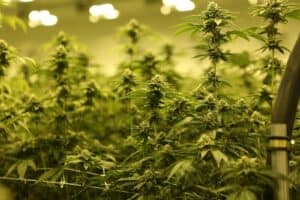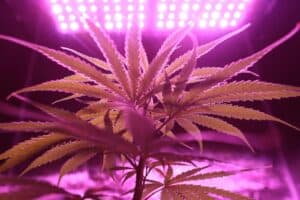Explore the science behind THC, its psychoactive effects, medicinal uses, and the future of delta-9-tetrahydrocannabinol in cannabis (marijuana) and THC products.
Key Takeaways
- THC (tetrahydrocannabinol) is the most abundant psychoactive constituent in the cannabis plant.
- THC interacts with CB1 receptors located in the central nervous system, resulting in a change in the secretion of certain neurotransmitters and related biochemical substances.
- This relationship can affect appetite as well as memory, mood, and sensory perception.
- THC is used in the treatment of severe pain, chemotherapy-induced nausea and vomiting, anorexia due to cancer, HIV/AIDS and other diseases, spasticity of multiple sclerosis, and, to some extent, PTSD and anxiety in controlled dosage.
Tetrahydrocannabinol (THC) is a compound that has generated much debate over the years. It is popular as the active component of cannabis sativa and the one that makes the plant popular for both recreational uses and medicinal purposes. This article discusses in detail the cannabinoid THC, including its legal status, its effects and potential therapeutic benefits, and its impact on society.
What is THC?
THC, delta-9-tetrahydrocannabinol – is one of over 100 cannabinoids contained in or produced by the cannabis plant. Cannabinoids are chemical substances that bind to cells of the endocannabinoid system, which is present in the human body and composed of a number of receptors responsible for controlling different functions such as mood, appetite, pain, or immunity.
THC is different because it mostly attaches itself to CB1 receptors which are abundant in the brain and nervous system. It is this interaction that is responsible for feeling high off herbal products.
How THC Affects the Body and Mind
It is important to understand that THC binds to CB1 receptors in the brain, changing the levels of some neurotransmitters that see moods, perceptions, and cognition skills altered.
Common Effects of THC:
- Euphoria: A sense of happiness, relaxation, and well-being.
- Altered Perception: A change in the sense of how time passes as well as how one’s environment appears.
- Increased Appetite: A phenomenon usually called the “munchies”.
- Pain Relief: THC can ease pain and inflammation.
- Impaired Memory and Focus: Temporarily causes the inability to retain brief information or focus.
These effects have different intensities depending on, among other things, the dosage, the method of consumption (be it smoking, edibles, vaping, etc.), personal tolerance level as well as the type of cannabis strain.
What Are the Uses of THC Medical Cannabis?
THC products, due to their psychoactive nature, have been known to induce euphoria as a therapeutic measure, and this has been utilized in modern and ancient medicine. Its use in the effective management of the symptoms of a great number of conditions has been proven by many studies. Such conditions include but are not limited to:
- Chronic Pain: THC is a medicine that has analgesic properties and can, therefore, alleviate pain among chronic patients, especially those with arthritis, fibromyalgia, and several types of peripheral neuropathy.
- Nausea and Vomiting: Chemotherapy-induced vomiting and nausea have been treated through supportive treatment employing THC medicinal cannabis drugs dronabinol and nabilone, both approved by the Food and Drug Administration (FDA).
- Appetite Stimulation: THC drug abuse may, in certain cases, also increase the appetite in patients with cases such as HIV or cancer other than improving nausea and vomiting caused by chemotherapy.
- Neurological disorders: New varieties of research inform that THC’s effect of cannabis could help decrease spasticity caused by multiple sclerosis and may also reduce the incidence of seizures in chronic epilepsy.
- Mental Health Conditions: This is rather contentious, but THC is legally allowed for PTSD and anxiety, as some research suggests it may ameliorate those symptoms when monitored by doctors.
Is THC Legal?
The status of the legality of THC is not universal, given the various countries across the globe. For example, some nations fully legalize THC and cannabis, whereas others are banned completely.
United States:
In the US, the legality of cannabis is determined at the state level. By 2024, 23 states have ended the prohibition of cannabis while numerous others admit it exclusively for medical use[1]. Despite this, cannabis is also classified as a Schedule I substance under federal law.
Canada:
Possessing cannabis products containing THC is a legal purchase for Canadian adults over 18 since this nation has enabled cannabis consumption formally during the last five years.
Europe:
Different approaches were used amongst the European countries in consideration of cannabis use and its legalization. As it is popularly known, cannabis for recreational use remains illegal in many countries; however, pockets like Germany and the Netherlands have made significant strides in the use of cannabis for both medicinal and recreational purposes.
Asia:
Restricted also is the use of THC in the continent of Asia. Recently, however, Thailand was featured across the world news for legalized cannabis usage, a huge change of pace for this part of the planet.
A worldwide pattern suggests that the legalization of cannabis and THC is on the rise, with politicians responding to the change in the trend and coming out with laws advocating for the use and dispensation of THC.
How is THC Used in Popular Culture?

Cannabis and THC have always been integrated with the day-to-day lifestyle of many people. When it comes to artistic creations, cannabis is often seen as a form of cultural rebellion, but one that can be quite inspirational from a creative standpoint.
- Music: Culturally, musicians like Bob Marley and Snoop Dogg have contributed to the growth of cannabis culture, promoting THC’s widespread acceptance in society.
- Film: Films like Pineapple Express and Daze and Confused have further accentuated the use of cannabis in the space of mainstream global cinema.
- Literature: The Beat Generation was heavily influenced by cannabis and prolific writers such as Jack Kerouac and Allen Ginsberg wrote about its effects in their creative pieces.
Despite these representations assisting in the destigmatization of cannabis, they have reinforced depriving perceptions of THC as recreational only and perhaps reducing its therapeutic efficacy.
What’s the Difference Between THC and CBD?
Cannabis contains a variety of compounds, two of the most commonly known are THC (tetrahydrocannabinol) and CBD (cannabidiol), which have both similarities and unique functions:
Psychoactivity
- THC: Known for its psychoactive properties, it’s responsible for the ‘high’ obtained by marijuana.
- CBD: Considered to be non-psychoactive. Hence, it cannot create a high.
Effects
- THC: Users are brought to a euphoric state, lower perception, and increased relaxation, and may, in some cases, experience anxiety or paranoia.
- CBD: Users experience calming effects, reduce anxiety, or have the ability to reverse the effects of THC.
Medical Uses
- THC: Used for treating pain, enhancing appetite, and lowering nausea (primarily for people undergoing chemotherapy).
- CBD: Used for anxiety, inflammation, epilepsy, and some other neurologic disorders.
Legality
- THC: Controlled or prohibited in varying locations due to its ability to produce a high effect.
- CBD: Has a wider acceptance and is legal in a number of places when it comes from hemp that has low THC.
CBD and THC both attach to the endocannabinoid system, but since they attach in different ways, it makes it ideal for performing different functions, either recreation or treatment.
What Are the New Patterns in THC Research and Development?

As more states legalize cannabis, so does the interest and scope of studies involving THC. Researchers are looking into new and more effective ways of using it.
- Microdosing: Microdosing’s definition is the consumption of a minuscule amount of THC so that the person does not feel high but receives therapeutic benefits. It has gained momentum among patients who wish to deal with symptoms without feeling out of control.
- Synthetic Cannabinoids: Synthetic manufacturing sources of THC have also become popular, with most pharmaceutical companies producing such compounds to assist in the final product containing fixed and safe doses. These include dronabinol and nabilone[2].
- Combination Therapies: This suggests that THC will enhance the effects of other cannabinoids, such as CBD (cannabidiol), which leads to improved therapeutic outcomes. For instance, since THC is known to cause anxiety and paranoia, THC’s adverse effects can be secured by mixing it with CBD.
- Targeted Delivery Systems: There has been notable growth in the use of nanotechnology, which in turn has assisted in the synthesis of THC delivery systems that have greater bioavailability and decreased adverse reactions.
THC and Public Health
The public health implications of THC cannot be ignored. It is imperative that governments and health organizations first highlight potential risks, followed by measures that maximize the health benefits.
- Education: Campaigning towards education can also take place. For instance, in society, the under-usage of THC can be advocated through health education targeting dosage, timing, and settings.
- Prevention of Youth Use: Undoubtedly, THC should not be used by minors as it can alter their brain functionality if exposure starts at an early age. Though students access marijuana at the age of 18 legally, there should be restrictions for students in schools and campuses.
- Driving Safety: Better testing protocols and specific legal thresholds will help mitigate the risk of accidents due to THC consumption.
- Healthcare Integration: If a patient takes THC or cannabis in any form without talking to their doctor first, it can result in poor treatment plans. So it is vital to understand and encourage patients to talk about their needs.
What is the Future of THC?
There are lots of possibilities when it comes to THC. Society will dictate how THC will be consumed, studied, and regarded. Key areas of focus include:
- Expanded Research: It is quite evident that legality or any revolutionary events slow down research development, but with most of the barriers gone, new studies about the compound will be undertaken.
- Global Legal Reform: Global policies vary, but this move will ensure that the product is more available.
- Innovation in Products: Cannabis consumption is not going anywhere anytime soon. There is too much innovation being done in the industry, with companies bringing new products such as THC drinks, edibles, and topicals.
Conclusion
THC continues to be an interesting and complex compound regarding debates surrounding marijuana. Its ability to relieve pain for thousands of individuals necessitates its medical functionality while its cultural and social interests appeal to the greater society. Society should be able to use THC by weighing its advantages against any possible disadvantages to ensure THC is beneficial to health, wellness, and development.
FAQs
- What is THC?
THC (delta-9-tetrahydrocannabinol) is the most active chemical constituent of marijuana. It interacts within and around the brain by affecting the endocannabinoid system and is associated with inducing happiness, perception changes, and pain management, among other functions.
- What effect does THC have on the brain and body?
CB1 receptors in the brain contact with THC, resulting in a change in the release of neurotransmitters. This connection can influence emotion, memory, hunger, and senses. Some of the most popular effects are relaxation, increased appetite, and temporary disruptions of one’s memory or concentration.
- Is THC the same as CBD?
Not at all. THC and CBD (Cannabidiol) are different cannabinoids both present in marijuana. THC is psychoactive, meaning it gives the user a “high” feeling. On the other hand, CBD is not psychoactive, meaning a person can benefit from using it without getting intoxicated.
- What are the therapeutic indications of THC?
THC may have many therapeutic uses, including these:
- Providing relief from long-lasting pain
- Relieving nausea and vomiting induced by chemotherapy
- Increasing appetite in patients with HIV/AIDS or cancer
- Relieving muscle tightness caused by multiple sclerosis
- Possibly alleviating PTSD and anxiety symptoms (at mild doses).
- Does THC Products have the potential to cause addiction?
Getting THC products from the black market may present some effects. Such THC is associated with addiction among certain individuals. It is estimated that around 10% of cannabis consumers may be predisposed to Cannabis Use Disorder(CUD), which is the pattern of use that leads to trouble managing use despite its ill effects. So, always make sure you get your products from a licenced shop or online vendor.
References
- Wilkinson ST, Yarnell S, Radhakrishnan R, Ball SA, D’Souza DC. Marijuana Legalization: Impact on Physicians and Public Health. Annu Rev Med. 2016;67:453-66. doi: 10.1146/annurev-med-050214-013454. Epub 2015 Oct 19. PMID: 26515984; PMCID: PMC4900958.
- Bonn-Miller MO, ElSohly MA, Loflin MJE, Chandra S, Vandrey R. Cannabis and cannabinoid drug development: evaluating botanical versus single molecule approaches. Int Rev Psychiatry. 2018 Jun;30(3):277-284. doi: 10.1080/09540261.2018.1474730. PMID: 30179534; PMCID: PMC6242809.








